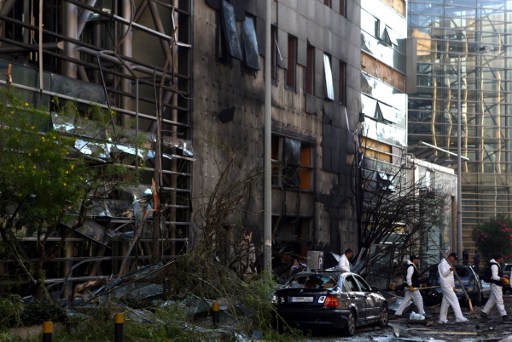Beirut-A Lebanese minister confirmed to Asharq Al-Awsat newspaper that the bombing which targeted BLOM Bank in Beirut on Sunday evening is “closely linked to the dispute between Lebanese banks and the so-called Hezbollah, which has criticized the performance of the banks in implementing U.S. sanctions aimed at tightening its noose financially.”
The ministerial source said whether it was the party that “sent the explosive message” or another side, they should be aware what the repercussions of such acts would have.
Hezbollah had informed Lebanese officials that it would not object to the implementation of the banks’ measure against it. Yet the source said that things could spiral out of control if there more developments linked to the case.
Although fingers were pointed at Hezbollah, the party stayed mum after the blast that targeted the bank. However, its ally, Speaker Nabih Berri said in a statement that the bombing “targets Lebanon first and Hezbollah second.”
Berri urged all the Lebanese “to remain united and not to be dragged into suspicious plans that target Lebanon’s future and its unique structure.”
The government was quick to convene under Prime Minister Tammam Salam at the Grand Serail. The session was attended by Berri’s adviser Finance Minister Ali Hassan Khalil, Central Bank Governor Riad Salameh and the head of the Association of Lebanese Banks, Joseph Tarabay.
Salam described the bombing as a “terrorist crime that aims to target economic stability.”
He said it targets Lebanon’s national security because the banking sector is the economy’s main engine.
The Association of Lebanese Banks also warned that the country’s financial sector was at risk.
After an emergency meeting on Monday morning, the association condemned the attack, which it said “hurt the entire banking sector and aims to rattle economic stability.”
“The Association is subject to the applicable Lebanese laws and to the Central Bank’s circulars,” the statement said.
Meanwhile, Lebanese security agencies completed their thorough inspection of the blast site in Beirut’s Verdun area at a time when the Intelligence Branch of the Internal Security Forces continued to collect evidence and carry out the initial investigation under the supervision of General Prosecutor Judge Samir Hammoud and State Commissioner to the Military Court Judge Saqr Saqr.
A security source told Asharq Al-Awsat that the first step the security agencies took was to inspect surveillance cameras in the area of the blast.
Investigators are trying to figure out whether the suspect, who planted the explosives, had come to the area on foot or by car.
“The more cameras we inspect, the clearer the image gets,” the source added.
Another security source told Asharq Al-Awsat that police suspect a car had come to the site less than a minute before the blast. Its driver parked it in the middle of the road, went out, headed to the pavement near the bank’s wall for a few seconds, returned to the vehicle and sped away.
However, the source said “the cameras that have been analyzed so far, have not yet shown any suspect.”
